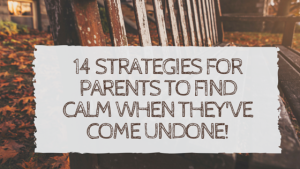Parenting is triggering. There’s no way around that. We get tense when our toddlers won’t put their shoes on, or when our six year old screams at us and kicks the door, or pushes her glass of milk off the table instead of eating her greens.
And then we come undone. We yell, we grab our kids a little too tight, we say things we didn’t mean to say, and we blame them for their behavior. Often what makes parenting so hard are the ways in which we get triggered or the stress that mounts and explodes.
But when we yell and punish, or grab too tight, or demand that they take a time out, they become more angry and resentful. We drive a wedge between us and the tension only mounts.
So the next time you feel like screaming at your child and telling him he can’t go to the movies on Saturday, here are a few things that you can do instead. Some are things you can do in the moment when you’re about to lose it—or you already have—and some of these strategies require a little more time and support to get the respite you need.
In the Moment:
1. Stop what you are doing. Don’t talk, don’t scold, just stop.
2. Take three deep breathes to find calm. Many people find that stopping for a few minutes to focus on their breath is a great tension-breaker. For some of us, taking a short time to do this at the beginning of the day or at some other regular time helps keep our tension load manageable.
3. Tell your child you need to take a break and step away from the situation for a moment. “Mommy, is upset. I need to cool down.” That might mean going to the bathroom to have a short cry, finding a pillow to scream in or stepping outside for a moment to change scenes if there is a calm adult nearby who can stay with your child.
4. Drink a tall glass of water slowly.
5. Lie down on the floor. Lying down on the floor is a powerful way to take a break from a situation that’s got you steamed. Sometimes when you’re locked in a power struggle with your little one, or about to blow your top, lying down can help reset your emotions and break the power imbalance between you and your child. Your little ones may come around and be curious or climb on top of you. Lying down allows for a fresh start to emerge, and it brings an end to the behaviors that weren’t working.
 6. Remember someone you love. Put your attention on someone you care about or a happier time with your child. Sometimes what makes parenting so hard is the isolation of it all, and when we focus on good times and people we love, it can change our mindset in a difficult moment.
6. Remember someone you love. Put your attention on someone you care about or a happier time with your child. Sometimes what makes parenting so hard is the isolation of it all, and when we focus on good times and people we love, it can change our mindset in a difficult moment.
7. If you’re driving and the kids are in the back fighting, stop the car and take a brisk walk around the block with everyone to shake things up.
When you have a little more time to get back to balance:
8. Take a hot shower or bath. This is both soothing and resetting and can calm the triggers that got ignited.
9. Call a friend. Tell them what’s got you stressed about your child (out of ear shot of your kid) and have a good cry or a nice long griping session. One mom I know put the name and number of her friend by the phone so that when she started to yell or threaten her daughter, her daughter would tell her to pick up the phone and call her friend. Often, it was enough for the mom to just see the number and she would start to calm down.
10. Put on some music and dance! This can help your little one reset as well.
11. Take a brisk walk around the block. Taking a walk or doing some sort of movement, whether it’s a quick yoga pose or stretch can change how you feel.
Ongoing Strategies:
12. Develop a regular system of self-care. As parents, some days it seems impossible to care for ourselves, but finding something we can do each week to lift the stress of constant caregiving is important. Whether it’s exercising, a regular walk or coffee date with a friend, or a monthly mom or dad’s get-together, make this a priority as often as possible.
13. Create a Relaxation Practice. Nowadays it’s hard to dispute—a regular practice of meditation, mindfulness, or breathing (even just five to ten minutes a day) is a powerful way to shift your mindset and bring a deeper level of relaxation and well-being to your life so that you can be more pleased with yourself and your children and less reactive.
 14. Find a listening partner. Getting the support you need by sharing the challenges and joys of parenting with another parent is an important tool in the Parenting by Connection practice. Find someone that you can call each week. Whether it’s 30 minutes or an hour, split the time evenly. The job of the listener is to listen without giving advice or suggestions and to create a space where the other parent can feel safe enough to share her darkest moments in parenting and figure out how to work through and move forward with the many conundrums and decisions we’re faced with as parents.
14. Find a listening partner. Getting the support you need by sharing the challenges and joys of parenting with another parent is an important tool in the Parenting by Connection practice. Find someone that you can call each week. Whether it’s 30 minutes or an hour, split the time evenly. The job of the listener is to listen without giving advice or suggestions and to create a space where the other parent can feel safe enough to share her darkest moments in parenting and figure out how to work through and move forward with the many conundrums and decisions we’re faced with as parents.
[optin-cat id=”620″]



